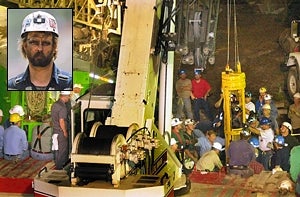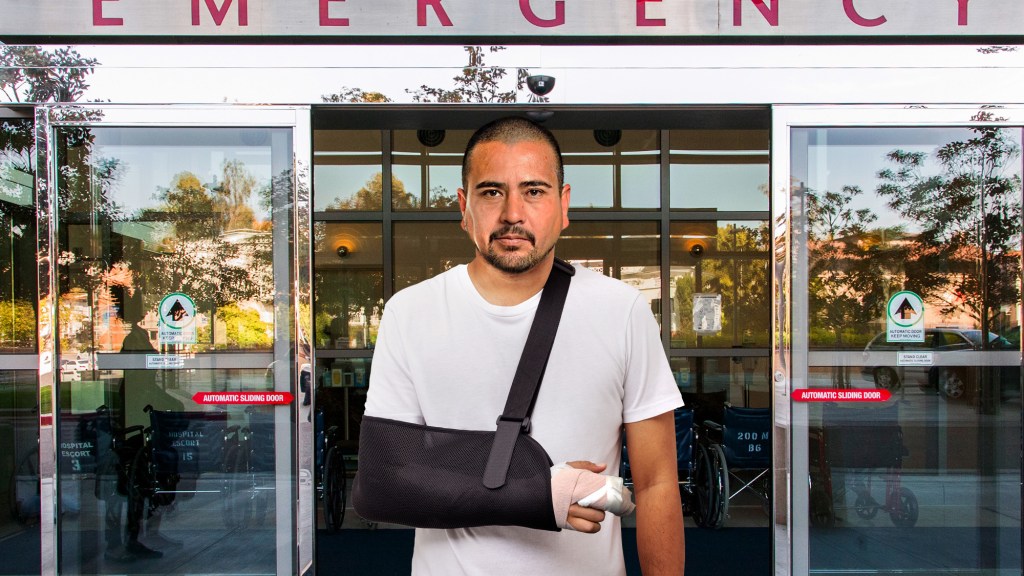MCINTYRE, PA—Kevin Rybicki, a coal miner trapped 340 feet underground, wished Monday that he had more headlamp batteries, another sandwich, and access to the coverage of his plight—which, he assumes, is captivating the nation.

“I can’t believe how much this sucks,” the 47-year-old Western Pennsylvania Mining Corporation employee said, speaking into the darkness. “I’m trapped, I can’t stand up, I’m scared to death, and, to top it off, I’m missing all the news stories about me. My big moment, and I’m stuck hundreds of feet below the action.”
Coverage of the disaster started just after noon Friday, when the Western Pennsylvania News-Leader announced that a series of load-bearing tunnel spars had collapsed and trapped 32 miners. The paper reported that rescuers were able to free all of the miners except for Rybicki, who was separated from his team by a wall of rock and debris following the cave-in.
After hearing the sounds of rescuers working to free him, Rybicki organized his meager supplies and settled into his crouched position.
“I wonder if there are helicopters out there,” Rybicki said as he banged a fist-sized rock against the wall above in hopes of helping rescuers pinpoint his location. “I’m sure, at the very least, there’s a whole bunch of vans with satellite dishes on them.”
At 4 a.m. Saturday, Rybicki determined that the seep-water level was rising at a rate of about two inches per hour. Several hours before, the Saturday Philadelphia Inquirer went to press with a photo of Rybicki on the front page, above the fold, under the headline “Miner In Peril.”
By Saturday afternoon, out-of-state mobile camera crews began to arrive in McIntyre. Shortly thereafter, MSNBC aired an interview with a Western Pennsylvania spokesman who described the friable, shifting rock under which Rybicki was trapped. The story marked Rybicki’s national-television debut and included a group photo of Rybicki and several other miners.
“You know what I hope?” Rybicki said Sunday afternoon, angling his face toward the 20-inch pocket of air at the top of the nearly flooded four-foot-high tunnel in which he was trapped. “I hope they use that picture of me hitting that two-run homer in the softball game last year. Or better yet, one of me and my kids. Clay and Becky would love to see their faces on television.”
Added Rybicki: “I’d love to see their faces again, too. Or hear their voices.”
As nationwide coverage continued and the carbon-dioxide levels rose within Rybicki’s cramped space, he missed some extremely compelling reportage. ABC’s Good Morning America aired a brief but engaging overview of his mining career which included the much-told family chestnut of how his father and uncle were involved in previous mine accidents.
“If they’d figure out a way to drill through this cap rock and string me down a microphone or something, then I’d be able to tell them about me firsthand,” Rybicki said. “I’m sure it’d be more exciting for the viewers than hearing one of the other miners describe me. I mean, really, the guys only know so much.”
CBS aired a tearful but hopeful interview with Rybicki’s wife, of which Rybicki would certainly have been proud.
“I wish Kevin was here to see this,” said Claire Rybicki, his wife of 11 years, unconsciously echoing her husband’s thoughts. “If I know my husband, he’d be touched and impressed by this nationally televised show of support.”
As of press time, Rybicki was using a rusty nail to scratch his wife a note on a Hostess Cupcake wrapper.
“Man, I sure hope Claire’s recording all the news,” Rybicki said. “I’m not sure if she knows how to set the VCR. Then again, if this ends badly, then she’ll have it on tape. That’d be horrible.”
“Hello?” Rybicki added suddenly, dropping his nail in the neck-level water. “Hello? Anyone?”







